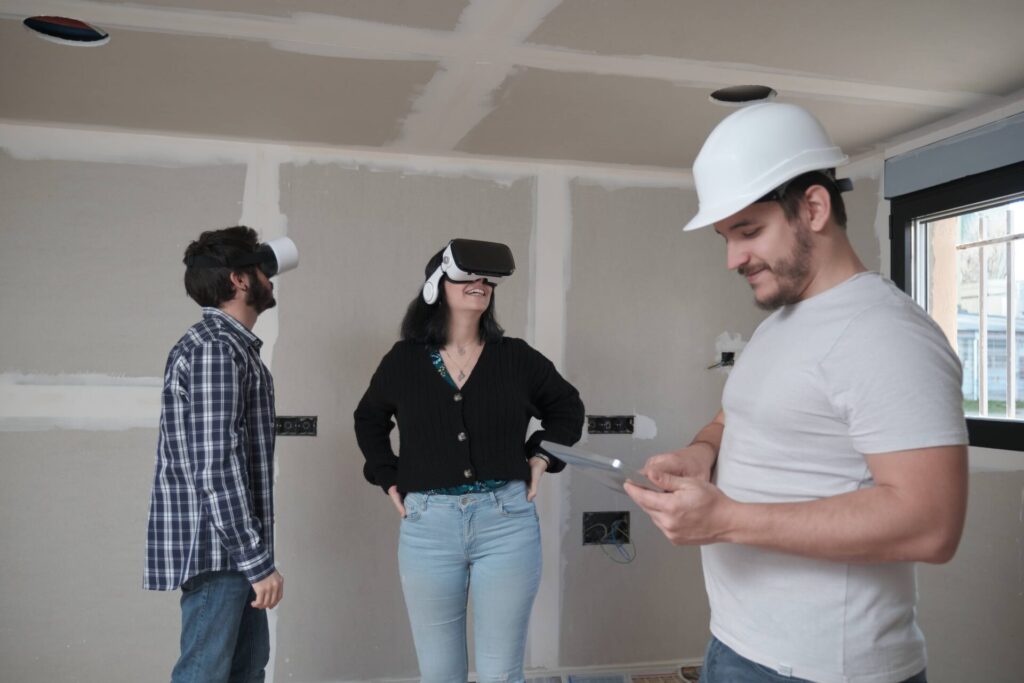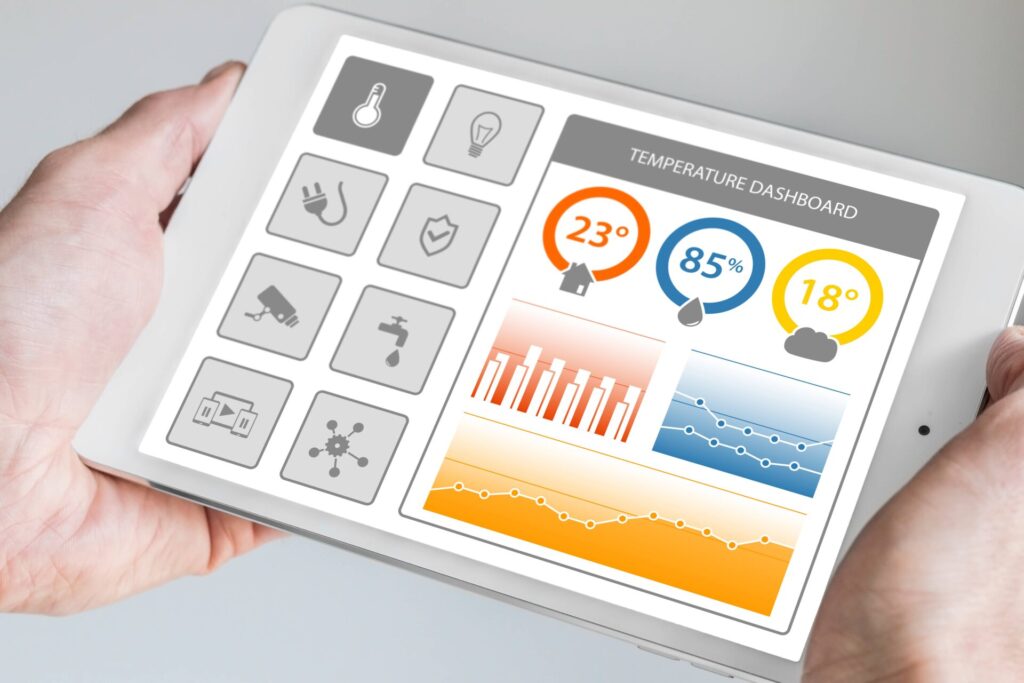How Technology is Transforming Real Estate?
Once upon a time, the real estate world was like a game of chess, where strategic moves and in-person meetings reigned supreme. When we fast-forward to the present, we discover that technology has profoundly changed how we buy, sell, and interact with real estate, redefining the game’s rules. It’s comparable to switching from a chessboard to a modern video gaming console, where new opportunities and difficulties present themselves at every move.
The real estate sector has advanced significantly since its early days of Internet listings, embracing cutting-edge developments like virtual tours, smart homes, artificial intelligence, and blockchain technology. These technological developments have altered how buyers, sellers, and agents approach their work and become part of the fabric of the real estate industry.
Virtual tours and smart houses have become two of the most significant game-changers in this brave new world, revolutionizing the way we view properties and raising the bar for what we demand from our homes. These innovations have raised the bar for the real estate business, from the ease of remotely inspecting houses to the increased comfort and efficiency offered by intelligent home systems.
In this article, we’ll embark on an exploratory journey, delving into the profound impact of virtual tours and smart homes on the industry. We’ll figure out the factors that contributed to their success, evaluate the advantages and disadvantages, and look at how these innovations will affect real estate in the future. So buckle on, and let’s explore the world of technology-assisted real estate!
The Advent of Virtual Tours

Contrasting Traditional In-Person Property Visits with Virtual Tours
Picture this: you’re house hunting, and instead of spending countless hours driving around town, you’re sitting comfortably on your couch, taking a virtual stroll through your dream home. The world of virtual tours has ushered in a new era, making traditional in-person property visits seem almost archaic. While nothing can quite replace the feeling of physically stepping into a space, virtual tours offer a viable alternative, bridging the gap between convenience and experience.
Mechanics of Virtual Tours
Virtual tours use a combination of high-resolution images, 360-degree panoramas, and sophisticated algorithms. Together, these elements produce an immersive, interactive experience that enables prospective buyers to tour a property from the comfort of their own homes. Some virtual tours even feature 3D floor plans and virtual staging, further enhancing the user experience and giving a sense of what it would be like to live in the space.
Benefits and Drawbacks of Virtual Tours for Buyers, Sellers, and Agents
Virtual tours come with a host of advantages. For buyers, they provide a convenient way to view multiple properties without the hassle of travel, saving both time and energy. Sellers benefit from an increased pool of potential buyers, as the virtual format makes it easier to reach a wider audience. Agents, too, reap the rewards of streamlined property showings and a more efficient sales process.
However, virtual tours are not without their limitations. While they offer a visually immersive experience, they can’t fully capture the ambiance and feel of a property. Furthermore, technical glitches or poor-quality imagery can hinder the user experience and potentially deter prospective buyers.
The Smart Home Revolution
Unveiling the Idea of Smart Homes and Their Growing Popularity
Imagine a home that knows your preferences, anticipates your needs, and creates an environment tailored to your comfort. That is the beauty of smart homes: the fusion of technology and ingenuity to improve the quality, efficiency, and ease of our lives. The smart house revolution is sweeping the real estate industry thanks to the growth of IoT (Internet of Things) devices and AI (Artificial Intelligence) breakthroughs.
Technologies Behind Smart Homes, such as IoT and AI
A smart home’s network of interconnected gadgets, sensors, and systems forms its center. Smart lighting, security cameras, and thermostats are a few examples of IoT devices that may be remotely managed via a smartphone app or central hub. Voice control and automation are made possible by AI-powered virtual assistants like Google Assistant and Amazon’s Alexa, which improve the experience of living in a smart home.
Evaluating the Impact of Smart Homes on Property Value and Market Demand
As smart homes gain popularity, their influence on property value and market demand is becoming increasingly apparent. Properties equipped with smart technology often fetch higher prices and attract more interest from potential buyers. Additionally, as consumers grow acclimated to the convenience, effectiveness, and security that these cutting-edge houses provide, the market for smart homes is predicted to increase. Smart homes are positioned to play a crucial role in the future of the real estate sector as it continues to change.
Augmented and Virtual Reality in Real Estate

Understanding Augmented Reality (AR) and Virtual Reality (VR) in Property Visualization
Virtual reality (VR) and augmented reality (AR) are two revolutionary technologies that have entered the real estate market. While both offer immersive experiences, they differ in their approach. AR overlays digital information onto the user’s view of the real world, while VR completely immerses the user in a computer-generated environment. Together, they’re transforming property visualization and opening up new possibilities for buyers, sellers, and agents.
Benefits of AR and VR for Property Showcasing and Decision-Making
AR and VR technologies offer numerous benefits for property showcasing and decision-making. For instance, AR can bring floor plans to life or virtually stage an empty room, helping potential buyers visualize the space more effectively. Virtual reality (VR) goes one step further by enabling viewers to virtually “walk through” a space, offering a more engaging experience than static images or movies.
All parties concerned might potentially save time and money by utilizing these technologies.
By offering a realistic representation of a property, AR and VR can reduce the need for multiple in-person visits, streamlining the decision-making process for buyers and agents.
Blockchain and Real Estate Transactions
Blockchain Technology and Its Potential Applications in Real Estate
The real estate sector could undergo a change thanks to blockchain, the technology that powers cryptocurrencies like Bitcoin. Blockchain is fundamentally a decentralized digital ledger that securely logs transactions and makes it nearly hard to tamper with or change the data. This characteristic makes blockchain an attractive option for real estate transactions, where trust, transparency, and security are paramount.
Advantages and Challenges of Blockchain-Based Transactions
Blockchain technology offers numerous advantages for real estate transactions. Some of the key benefits include increased transparency, reduced transaction times, and lower costs due to the elimination of intermediaries. Blockchain also allows for the creation of smart contracts, which can automatically execute agreements based on predefined conditions, further streamlining the transaction process.
Yet, integrating blockchain in the real estate sector is not without its difficulties. Technology adoption is still in its early phases, and there aren’t yet any established standards or laws. Also, some people could find it difficult to comprehend or have faith in the technology due to its intricacy.
Despite these challenges, the potential of blockchain in real estate is undeniable. As the technology matures and becomes more widely adopted, it could pave the way for a more efficient, secure, and transparent real estate market.
Real-World Applications and Testimonials

Showcasing Success Stories and Testimonials from Industry Professionals
The transformative impact of technology on the real estate industry becomes more apparent when we examine real-world success stories and testimonials from industry professionals. These examples provide us a taste of how new technology has changed the market, opening up new possibilities and enhancing the overall experience for agents, sellers, and buyers.
- Virtual tours leading to quicker sales: Many agents have reported that properties with virtual tours sell faster than those without, as the immersive experience allows potential buyers to narrow down their choices and make decisions more quickly. One agent shared that a property received multiple offers within a week of being listed, thanks in part to the engaging virtual tour.
- Smart home technology attracting premium buyers: Sellers and agents have noticed that properties with smart home features tend to attract more interest, particularly from tech-savvy or environmentally-conscious buyers. In one instance, a seller credited their home’s smart thermostat and energy-efficient lighting system as key factors in securing a higher sale price.
- Data-driven insights guiding investment decisions: Real estate investors have increasingly turned to data analytics to identify profitable opportunities and make informed decisions. One investor shared how a data-driven platform helped them identify an up-and-coming neighborhood with strong potential for appreciation, leading to a successful property investment.
Analyzing Case Studies of Real Estate Transactions Involving Virtual Tours, Smart Homes, and Other Technologies
A deeper look at specific case studies can further demonstrate the practical applications of technology in real estate transactions:
- Virtual tours during the COVID-19 pandemic: During the height of the pandemic, when in-person property visits were restricted, virtual tours became essential in maintaining market activity. Agents who quickly adopted this technology were able to continue showing properties and closing deals, while those who hesitated faced significant challenges.
- Smart home automation in multi-family buildings: In a recent case, a property management company upgraded a multi-family building with smart home technology, including keyless entry systems, smart thermostats, and energy-efficient lighting. The result was a significant increase in tenant satisfaction and a reduction in energy costs, ultimately leading to higher rental rates and property value.
- Blockchain-based property transactions: In a pioneering example, a property in Europe was sold entirely through a blockchain-based transaction, with the buyer and seller never meeting in person. The process, which included the use of smart contracts, significantly reduced transaction times and eliminated intermediaries, showcasing the potential of blockchain technology in real estate.
The Growing Importance of Data and Analytics
Role of Data and Analytics in the Real Estate Market
In the age of information, data, and analytics have become indispensable tools in the real estate market. From market trends and pricing insights to consumer preferences and behavioral patterns, data-driven insights are reshaping the way we make decisions about property transactions. Buyers, sellers, and brokers can all make better decisions and open up new market opportunities by utilizing the power of data.
Benefits of Data-Driven Decision-Making for Buyers, Sellers, and Agents
The use of data-driven decision-making in real estate transactions has numerous advantages for all parties involved. For buyers, it enables them to find properties that align with their preferences and budget while also identifying potential risks and opportunities. Sellers can leverage data to price their properties competitively, optimize their marketing strategies, and attract the right buyers. On the other hand, agents can use data to personalize services for their clients, comprehend market dynamics, and outperform rivals.
Buyers, sellers, and brokers may negotiate the complexity of the real estate market with greater confidence and accuracy by adopting data-driven decision-making, which will result in more successful transactions and pleased customers.
Predicting the Role of Technology in the Real Estate Market

As we look toward the future, it’s clear that technology will continue to play a significant role in shaping the real estate market. From virtual tours and smart homes to blockchain and data analytics, these innovations will become increasingly integral to the way we buy, sell, and manage properties.
Identifying Potential Challenges and Opportunities for the Industry
The rapid advancement of technology also brings its fair share of challenges and opportunities for the real estate industry. Some potential challenges include:
- Adoption and integration: The successful implementation of new technologies requires widespread adoption and integration, which can be a time-consuming and resource-intensive process for businesses and professionals.
- Privacy and security concerns: As more data is collected and stored, ensuring the privacy and security of sensitive information becomes increasingly crucial.
- Regulatory compliance: The introduction of new technologies often leads to the need for updated regulations and compliance measures, which can be complex and challenging to navigate.
However, the opportunities presented by technology in real estate are vast:
- Increased efficiency and cost savings: Technology has the potential to streamline processes, reduce transaction times, and minimize costs for buyers, sellers, and agents.
- Enhanced decision-making: Data-driven insights enable more informed decision-making, leading to better outcomes for all parties involved.
- Greater accessibility and inclusivity: Technological innovations can make the real estate market more accessible to a wider audience, breaking down traditional barriers and creating new opportunities for investment and homeownership.
- Sustainability and eco-friendliness: Smart home technologies and energy-efficient innovations can contribute to a more sustainable and environmentally friendly real estate market.
Possible Innovations and Their Implications for Buyers, Sellers, and Agents
As technology continues to evolve, we can expect new innovations to emerge in the real estate sector. Some possibilities include the following:
- The rise of proptech startups: The growth of property technology (proptech) startups will drive innovation and provide novel solutions to challenges faced by the industry.
- Integration of AI and machine learning: The increased use of artificial intelligence and machine learning technologies could lead to more advanced data analysis, personalized recommendations, and intelligent automation of routine tasks.
- Widespread adoption of 5G and IoT: With the rollout of 5G networks and the expansion of IoT, we can anticipate faster and more reliable connectivity, enabling seamless communication between smart devices and enhancing the overall smart home experience.
- The tokenization of real estate assets: Blockchain technology may make it possible to tokenize real estate assets, opening up new investment opportunities by enabling investors to purchase fractional ownership of properties.
These innovations, along with many others, will shape the future of the real estate industry, offering buyers, sellers, and agents a more efficient, transparent, and dynamic market landscape.
Conclusion
Reflecting on the Transformative Power of Technology in the Real Estate Sector
As we’ve explored throughout this article, technology has undeniably had a transformative impact on the real estate sector. From virtual tours and smart homes to augmented reality and blockchain, these innovations have revolutionized the way properties are bought, sold, and managed. The real estate market is now more effective, open, and accessible, providing a wide range of advantages for both buyers and sellers as well as agents.
In the years to come, the constantly developing nature of technology is expected to bring even more developments and opportunities, further reshaping the real estate landscape and redefining what is possible within the sector.
Stay Informed About Technological Advancements and Their Impact on the Market
As technology continues to evolve at a rapid pace, it’s crucial for stakeholders in the real estate market to stay informed and adapt to these changes. By embracing technological advancements and understanding their impact on the market, buyers, sellers, and agents can position themselves for success in this dynamic and competitive industry.
You can take full advantage of the opportunities offered by technology, whether you’re a first-time home buyer, an experienced investor, or a real estate expert, by keeping an eye on the most recent developments and trends. Without a doubt, as we look to the future, technology will continue to be a driving force in the real estate market, providing limitless opportunities for those willing to embrace it.
Frequently Asked Questions
Many online property listing platforms have filters that allow you to search for properties with specific features, such as virtual tours or smart home technologies. Additionally, you can consult with a real estate agent who specializes in tech-forward properties to help you find the perfect match for your needs.
The cost of implementing virtual tours and smart home technologies can vary depending on the complexity and scale of the project. While there may be some upfront costs, investing in these features can lead to higher sale prices and faster transactions, ultimately making it a worthwhile investment for many sellers.
While smart home systems have numerous advantages, if they are not properly maintained, they may also pose certain security and privacy threats. Use solid, one-of-a-kind passwords, maintain your devices up to date with the most recent firmware, and make sure to spend money on trustworthy, secure items from dependable manufacturers to preserve your privacy and guarantee the security of your smart home system.
Although blockchain technology provides many benefits, there are some possible negatives as well, including implementation challenges, the requirement for regulatory compliance, and the necessity for mass use to achieve optimum efficiency. It’s conceivable that some of these issues may be resolved as the technology develops, making blockchain-based transactions more available and useful.
The real estate industry has seen a substantial transformation because to technology, but real estate agents are unlikely to be entirely replaced. Human expertise, local market knowledge, and personalized service are still essential aspects of the property transaction process that cannot be fully replicated by technology. Agents will be better able to fulfill the changing demands of their clients and maintain their competitiveness in the market, though, if they embrace technology and use it to supplement their existing talents.
